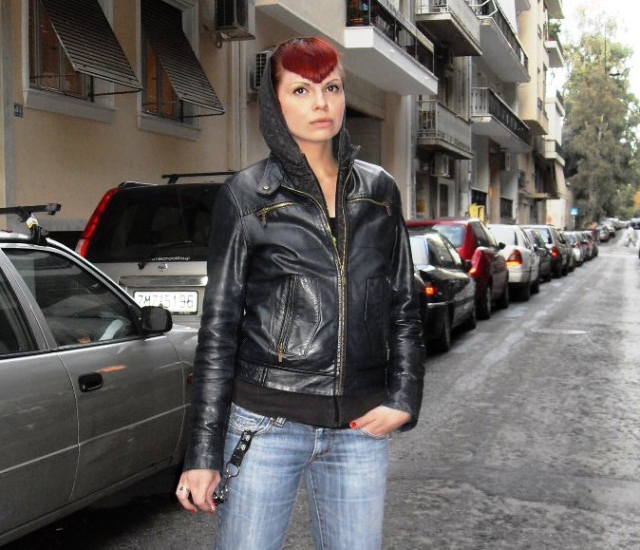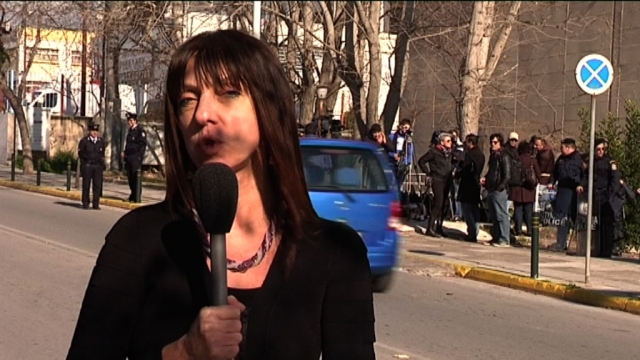
Social unrest in Greece does not subside and is often accompanied by massive street riots. The world learns about them from us, the reporters, who breathe tear gas, stoop to avoid the next flying stone, pass by burning trash bins. What does it mean to be a reporter during riots – here are our team’s impressions.
Protesters lack imagination
Marina Nikolova
In an interview on CNN Oprah Winfrey says that she always takes the side of the poor and the downtrodden, the troubled people because she can be in their place. Remember it! I am running to the subject about which we have chosen to write in the blog - what do we, as journalist, think of at the demonstrations that happen quite often lately. I changed as someone who has lived in Greece for many years and I began to take the demonstrations as something usual. Over a year of active protests of drivers, television technicians, students, teachers, families with many children, communists, immigrants. It is never boring here with us!
But I will say that protesters lack imagination – they could sing playful slogans and change the repertoire, organize interesting happenings or just effective events to achieve their goals. But it is difficult for them to admit they are only occasionally involved in a great show that has its price every time - the anger of passengers in the public transport on strike or of drivers because the city centre is closed.
The real communist rallies in Greece which involve open-minded volunteers sometimes make me feel like I am on parade of Mao in China, just as I imagine it. Workers sing the anthem of the Socialist International with raised fists, others come to the demonstration with helmets hung on the pants, the rest hold their hands in a human chain to express their solidarity. Slogans for class struggle. It all sounds like something that has been taken out from other decades.
Sharp eyes, fire in the eyes, hormones in the red ... People in Greece go to demonstrations because they believe that this is their way of protest here and now, en masse, to show their strength against any regulation the Members of Parliament are preparing to vote.
I'll never get used to tear gas
Victoria Mindova

Protests in Greece follow the same course in most of the cases. Some left-wing unions announce a strike and go to protest in downtown Athens or Thessaloniki. They bring their protest posters, big megaphones, and sunglasses if the weather is nice. They shout against the government in power and its measures and then disperse.
You can always feel when things will turn from an usual Greek protest into stones, Molotovs and tear gas. The shadows of the anarchists are seen early in the rally. If it is a procession, their group is always the last. Tensions escalate while ordinary protesters chant. People with all kinds of suppressed problems find a way to express their discontent, frustration and anger, which is not always the result of the specific case. Slogans like "Cops-Pigs", "Animals-Killers" and the like are often heard.
Yelling, screaming and tension unleash. Only a second is left to the sign - the boys in black with gas masks, stones and what not in hands run away from the crowd. Civilian protesters sink in it and the urban warfare starts - pieces of curbs fly, Molotov falls down with a crash from somewhere. Police officers armed with helmets, shields and arms and legs protectors use the tear gas and carry on with the crowd.
The ears are roaring with adrenaline and I try to make a nice picture of an anarchist at a time when he throws the Molotov or of a policeman who had raised the truncheon against a participant in the protest. It was the first protest I covered. My eyes and throat are hot, my nose runs five times more than it does during the worst runny nose and I ask: "What, the fuck, will change tomorrow? What do these people want? They all know that five stones thrown and another 10, 20, and even 100 Molotovs will change nothing!" Then it came to my mind – they all have fun!
I go to hardcore concerts for a long time. The music there is strong, aggressive and soaked with rage. It blows your head. You can jump, dance and get as crazy as you like without even care what the person next to you will think because he or she came to do the same. I go because I like it. I have fun. Because I feel refined, more relaxed and more prepared to face the reality of everyday life after the concert.
Apparently, the so-called anarchists feel the same way after riots. And you just breathe cigarette smoke at the concert in the worst case, not tear gas. I’ll never get used to it.
Ordinary Greeks forget that they are the ones to choose their governors
Anastasia Balezdrova
Greece has a long and rich tradition in protests which often end with a shower of tear gas by the police in response to the attacks with stones and Molotov cocktails from protesters. The so-called "known unknown" or "hooded youths" are on almost any strike or protest rally for the sole purpose to cause confusion and clashes. This happened during the last Panhellenic strike in December when a group of anarchists literally tore the flow of protesters in two still at the beginning. They dispersed the peaceful demonstrators, causing fires and severe damages to shops in downtown Athens.
What was typical for this case was that other smaller groups were active in the small streets around Syntagma Square in parallel and their sole purpose was to induce riots and clashes with police. But if the participants once were young, still faithful to the ideals of the Comintern and the adored Marx, Bakunin and Che Guevara now more and more leftists are willing to follow their example.
The severe economic measures of the government trouble larger part of the Greek society. As result, many otherwise peaceful citizens become part of the slogans such as "Let’s burn the parliament brothel." Messages like "Let’s conquer the parliament peacefully" are exchanged in the blogosphere and e-mails and calls "Let’s break it all" are heard from people who have never participated in protests.
The only difference between them is the ideological justification. Hooded youths with hidden faces still believe in anarchism, members of the Communist party follow the Stalin's line of the main secretary Aleka Papariga and ordinary Greeks simply had enough of parties and politicians and protest against the overall political system, forgetting that they themselves have elected its representatives.
There is no frame or picture worth beating you
Maria Spassova

I was tear-gassed for the first time in 2003. I was still a greenhorn then. But I learned to keep out. I experienced a lot of street riots in Athens. The wave of unrest after the arrest of the Kurdish rebel leader Abdullah Ocalan, the protests against NATO during the Kosovo war, the chaos in downtown Athens after the murder of Alexis Grigoropoulos and now the demonstrations caused by the economic crisis. It doesn’t matter whether I go to a prestigious economic conference or to the next protest rally - I'm a reporter and I have to do my job as a professional. To be the eyes and ears of the readers and viewers and to help them understand and explain what they saw or read.
I try to be the mainstay of my camera-man to be really sure he has a "back". Anarchists despise journalists, but they deeply resent operators and photographers. They are really aggressive to them. However, we try to get closer to them as much as possible, to see, to feel and to know what is happening on the street.There where Molotov cocktails are thrown, stones fly and truncheons crack. We have been beaten so far neither by police, nor by anarchists. But colleagues were beaten before my eyes – by the police and by demonstrators. They came back with broken and burnt cameras.
Our adrenaline goes up along with the adrenaline of the vandals and the special forces and there is always the risk to be exposed to greater danger than it is worth. There is no frame or a picture worth beating you. So, it is very important to know when to step back. This is what I tell my girls at GRReporter. We often talk on the phone when they are at a protest. Each of them has her limit of endurance. It is important not to take undue risks. My biggest fear is any of them not to get hurt.
For my self, I am afraid of being trampled by the crowd. When I feel that the masses begin to move chaotically I leave the battlefield. It takes 2-3 minutes the disorder to return to the limits within which I can get on the right track.
People often ask me: "But the whole demonstration was so peaceful. Why did you take out exactly those 5 minutes when the guys with black clothes and hoods appeared and started throwing bombs?" Because the news is the extraordinary, the unusual, the news is what goes beyond the normal course of things. Nobody makes reports that the plane from Athens arrived in Sofia on time. But if it falls...
I go home with a lot of bitterness in my heart after a protest. There is a lot of destructive energy on the street. Destructive forces prevail. Aggression is a way to prove yourself. I wonder why. Something did not work out back in the families of these young boys and girls. Someone has hurt them deeply and then neither school, nor society were able to heal this wound. I am not in sympathy with them but I do not hate them either. For me they are incurable children for whom there is no remedy.